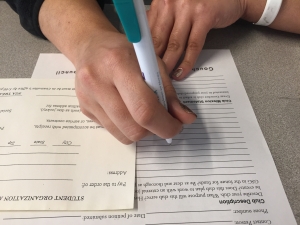
Goucher’s Club Council budget is currently facing an estimated $13,000 deficit with $200 left to allocate to clubs for the Spring semester, and ten or more clubs are facing deficits of their own ranging from $5 to upwards of thousands of dollars, according to Club Council officers.
In an interview, Club Council Treasurer Ridwan Lawal, ‘20, said that clubs known by Club Council to be facing deficits are aware of their situation.
While the college has not published an official statement about these deficits at the time of publication, club leaders have been aware of a substantial decrease in Club Council funds since the end of the Fall 2018 semester when they petitioned for Spring 2019 funds (aka Spring Budgeting) and received only as much as half of the money asked “due to the lack of Funds that the Council has,” as stated in the response emails from the Club Council Administrator John Nobriga, ‘19.
Understanding the Club Council Budget
Club Council receives funding from the yearly Student Activity Fee, which was $188 per student as a part of tuition costs this academic year. Its yearly budget also includes takebacks from the previous academic year. Takebacks is the operation by which any money that was allocated by Club Council to specific clubs and was not used by those clubs is then put back into Club Council’s general account. “Usually around October we know exactly how much Club Council has to distribute,” Aisha Rivers, Director of Student Engagement said in an interview. Club Council usually begins allocating funds to clubs before it gets the precise number of how much it has to spend for the year, going off of an estimate based on the previous year’s takebacks.
Petitioning is the process whereby Club Council allocates funds from its general account to specific clubs. Clubs petition for a certain amount of money, then Club Council votes on whether to approve all, a portion, or none of the amount. The final decision is signed off by the Club Council Administrator.
The Club Council Treasurer brings the approved petitions to their weekly meetings with the Director of Student Engagement and fills out transfer forms to record the amounts that Club Council is transferring into individual club accounts. “I’ll sign off on [them] trusting that Club Council understands what money they have and what money they don’t have,” Rivers said. “If anything goes weird then I’ll follow up on it or we’ll investigate it and figure out if something is not right and get back to the student club.”
Clubs also submit payment forms to Club Council to make their transactions and/or to receive money for transactions. These forms, which may be check requests, contracts, reimbursements, etc. are also signed by a club’s Treasurer, the Club Council Treasurer, and the Director of Student Engagement.
The Club Council treasurer brings all of the signed forms to the Controller’s Office. Credit card statements from the GSG (Goucher Student Government) credit cards, which are often used by clubs to make Club Council approved transactions, are also received by the Controller’s Office independently of Club Council. The Controller then inputs the information from all of the paperwork into its Excel sheets and its online accounting system, keeping track of amounts spent by clubs and the amounts remaining in their accounts.
The Deficits- An Interconnected Problem
“Club Council started this year with a deficit of $13,000,” Goucher’s Controller Alex Antkowiak said in a Feb 19th email interview. “This caused no alarm as the portfolio of all GSG [Goucher Student Government] accounts was larger than the deficit and estimated takebacks again exceeded the deficit.” Club council usually runs into a deficit every academic year which is then balanced out by student organization fund surpluses.
However, in October of 2018 (according to 2018 Club Council Treasurer Brett Rapkin-Citrenbaum, ‘20) Club Council and the Controller’s Office became aware of inconsistencies in their accounting.
Club Council was “under the impression that [the starting value given to them by the Controller’s Office] was including the amount that we had already given to clubs,” Rapkin-Citrenbaum said, which was not the case. Consequently, Club Council thought it had more money to spend than was actually in their account.
“The two separate numbers that we have don’t help,” Lawal said in an interview held with him and Rivers. Since the Controller’s Office and Club Council’s financial records varied not only with regards to the Club Council budget but also individual club account budgets, the origins and the extent of the deficit were unknown. “Which is a big reason why we have to go back one or two years now,” Rivers said.
The heart of the discrepancies in financial records lies in twofold miscommunication and mismanagement. To begin, miscommunication and mismanagement occurred between and by the Controller’s Office and Club Council. There are differences in the type of data collected and recorded by Club Council versus the type of data collected and recorded by the Controller’s Office. “We have data that says somebody made a check request, somebody took money out of their club account, but we don’t have data that says a club went negative at this time.” Lawal said in a separate interview. “We just have to look back at when all of these transactions happened and figure out when clubs actually went into their deficit, and it’s been the hardest thing to find.” “Sometimes we scanned [a form] and didn’t upload it, or we just forgot to scan it,” Nobriga said. Rapkin-Citrenbaum said in the Fall that “[s]ome stuff fell through the cracks essentially.”
On their end, the Controller’s Office is responsible for collecting and recording the forms that Club Council sends to them in addition to credit card statements. Rapkin-Citrenbaum said that “[t]here was a lot of miscommunication and confusing information about what transfer forms had been submitted, and there’s a problem with transfer forms being submitted twice. Account numbers between GSG, SET, and Club council are similar so sometimes there’s some confusion.”
Additionally, the systems used to record financial information and the amount of experience using and understanding them differs across Club Council and the Controller’s Office. The Controller’s Office uses a software that aggregates all of the financial information from clubs and Club Council, and it is accustomed to working with complex data and making financial calculations. Club Council, on the other hand, keeps track of club account information by scanning forms and uploading them to Google Drive and has a much more basic understanding of the kinds of calculations made in the Controller’s Office. “We also have this new online platform on Inside Goucher of where we can see the clubs, like, sort of live, like what’s in their accounts,” John said. What’s more, the Controller’s office organizes information according to calendar years while Club Council organizes information according to academic years.
“We’re all in agreement that we need a better system of tracking and communication,” Rivers said.
Miscommunication and mismanagement also occurred between Club Council and clubs themselves. This both contributed to the deficits and the sudden drop of Club Council funding at the end of the Fall 2018 semester. According to Rapkin-Citrenbaum, retroactive payments were made for costs that Club Council had not anticipated: GSG’s credit card was billed for a yearly subscription that Fashion Club had forgotten about and hadn’t petitioned to renew funds for, and reimbursements had to be made to an instructor that Salsa Club had brought in to teach lessons before submitting paperwork. Club Council collectively agreed to match conference fundraising amounts without a cap, so when Model United Nations raised $2,500, much more than expected, Club Council was obliged to meet that amount.
“There’s not a lot of strong treasurers that keep track of their club finances. They may be spending an amount that they believe they have but they don’t,” John Nobriga, ‘19, said in an interview. “We have to look back into past years ‘cause it might have been a situation where the clubs for a while have been in deficit and they just kept that deficit in there and everytime they use club council funds it’s still a deficit that’s never balanced out,” said Lawal.
Until the sources of these clubs’ deficits are identified and their accounts balanced– i.e. until both Club Council and the Controller’s Office are sure of how much money these clubs received and how much they spent– takebacks cannot occur. Club Council is planning to make takebacks a semesterly rather than yearly process, but has had to delay the change this semester. Club Council is therefore left with $200 left to spend from the previous semester.
The Office of Student Engagement saw staff and student leadership changes in the Fall and Spring which has complicated the process of investigating the deficit. “Aisha became the director of Student Engagement, which had been Stacy [Cooper Patterson]’s job. Stacy couldn’t really hold our hand the whole time, and Aisha was adjusting to her new job,” Rapkin-Citrenbaum said. “I’m still trying to learn and understand how decisions are being made,” Rivers said. Lawal also took over as Club Council Treasurer in the Spring and had to adjust to his new role while catching up on the financial developments. “I just want to get to the bottom of [these deficits],” said Lawal. “We’ve finally gotten over the pettiness.” “There’s a lot of new [changes], so we’re excited, but we’re also scared,” Nobriga said.
Club Council Changes Moving Forward
While Club Council and the Controller’s Office are still trying to match up records and some club accounts are still facing deficits, “GSG’s [2019] treasurer[, Ridwan Lawal, ‘20,] and Student Life Staff (Aisha Rivers) are currently investigating the matter,” said Antkowiak.
“The bottom line is we need better and improved communication and tracking,” said Rivers. “We’re trying to create the most specific guidelines for treasurers just to make these things avoidable in the future,” said Lawal. Rivers, Lawal, and Nobriga all hope to use Club Council’s current situation as a learning experience for how to better advise clubs in the future on how to track and budget finances, diversify sources of funding, and, in Rivers’ words, “really [think] purposefully and intentionally about the programs that they’re putting on in the college community. Even though this part is challenging and tedious, I am excited to see good things manifesting out of it,” she said.
In the meantime, Lawal says that “If [clubs] have money in their Club Council [aka general] account, they should use it […] if they don’t [know whether their financial information is accurate or not], the first thing to do is ask how much is in their account […] whether it’s accurate or not it’s what we have, which means, again, just ask. And if there’s a situation where we would prefer them not to [use their Club Council funds] it we’ll let them know.”
Until the deficit is determined, club accounts are balanced, and takebacks occur, Club Council’s budget moving forward is still a big unknown.
Updates forthcoming.
Correction:
March 14th, 2019.
A previous version erroneously reported that Model UN had raised $25,000 for a conference. The number was adjusted to $2,500.
